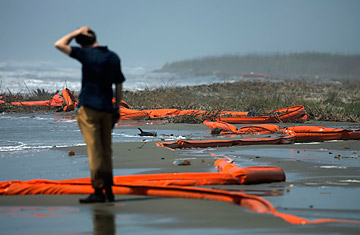
A TV reporter stands beside oil boom south of Venice, La., as oil leaking from the Deepwater Horizon wellhead continues to spread in the Gulf of Mexico, May 2, 2010
On Sunday, Charles Robin III, a fifth-generation shrimper on the Louisiana coast, sat in the cabin of his 52-foot boat, Ellie Margaret, and carefully contemplated his future. It's bleak. Millions of gallons of crude oil in the Gulf of Mexico are just miles south of his home in Hopedale, on the Mississippi River delta. Already, the National Oceanic and Atmospheric Administration has banned fishing in the area for at least the next nine days in the waters east of Hopedale and all the way to Florida. "Katrina dug a hole for us," he said that afternoon, sipping a glass of sweet tea. "We're laying in this grave, trying to get out of this hole, and this spill comes along."
The Gulf Coast's residents are accustomed to keeping an eye on the water, especially around June 1, the start of hurricane season. The past few days have been like watching the arrival of an oily storm. The wounds from Hurricane Katrina are still raw, especially in Hopedale, a fishing village in St. Bernard parish, about an hour's drive south of New Orleans. The parish, as counties are called in Louisiana, was among the hardest hit by Katrina. Floodwater from the Gulf of Mexico covered the swampy terrain. The recovery has been slow; the population has come back up to 40,655, nearly two-thirds of its pre-Katrina level. New homes are being built on stilts, between 30 and 50 feet above two-lane roads sometimes covered with swamp water. There's a new Wal-Mart, and outposts of the Dollar Store.
The parish's president, Craig Taffaro Jr., says, "It's enormously important that we don't have another disaster that would cause us to slow down." The loss will certainly be massive, if and when the oil reaches the shores of St. Bernard parish. That is likely to trigger losses of at least $1.5 million a month in the parish's seafood industry. That doesn't include losses in related industries: suppliers of nets, for instance, and hotels for recreational fishermen.
Soon after the April 20 explosion on the Deepwater Horizon rig leased by BP that sent oil gushing into the Gulf, Taffaro began drafting plans to protect his parish's waters. First, he set up a station of two large white tents along the bank of a bayou. From there, he hoped, local fisherman would bring boatloads of boom — the orange tubes used as barriers to prevent the oil's spread — into Bretton Bay, an estuary for shrimp leading out to the Gulf. Local fishermen were ready to volunteer to lay boom. Robin, the shrimper, recalls saying, "We can stop this. Let's catch it before it destroys our estuaries."
BP officials arrived midday Saturday, with thousands of feet of boom. On Saturday alone, more than 17,000 feet of boom were laid by local fishermen and shrimpers. But even that wasn't enough. Now, parish officials are negotiating the terms of contracts that will be offered to local fishermen for the use of boats and to work as crew members laying boom. "It's a win-win," Taffaro says, because "it puts people hurt by this directly to work."
There's some reason to be concerned about the contracts, though. Late yesterday, the U.S. Labor Department warned that cleanup workers face potential hazards from oil by-products, dispersants, detergents and degreasers. The government began distributing guides in English, Vietnamese and Spanish. Robin and others aren't sold on the BP contract. "We don't know how this thing is going to ruin us," he says. The rumored terms of a contract — about $2,000 per day, for the boat and crew — may not be enough to cover the $8,000 he'd have made on a good day during shrimping season, which usually begins in early spring.
The experience of Glen Swift, a 62-year-old fisherman in the town of Venice, La., just to the south of Hopedale, may be instructive. On Saturday, Swift attended one of the many recruiting sessions BP is hosting in high school gymnasiums and churches in fishing communities along the northern Gulf Coast. He picked up a contract that apparently offered to pay $2,000 per day for a 45-foot boat to be used exclusively for laying boom. There's talk, he says, that some of the contracts being negotiated will force fishermen to waive their right to sue BP. And he's not sure how long the contracts will last. Nevertheless, on Sunday, he submitted the signed contract to the local BP office. Now, he says, "I really don't know what I signed." He didn't send a copy to a lawyer friend in Illinois, or keep one for himself. BP officials have yet to call him. Now there's no fishing in the Gulf — by government orders. So, on Tuesday, he plans to take his boat onto the Mississippi River. "The fish in that river are still good," he says. "No oil's gotten in there." Thankfully, not yet.
